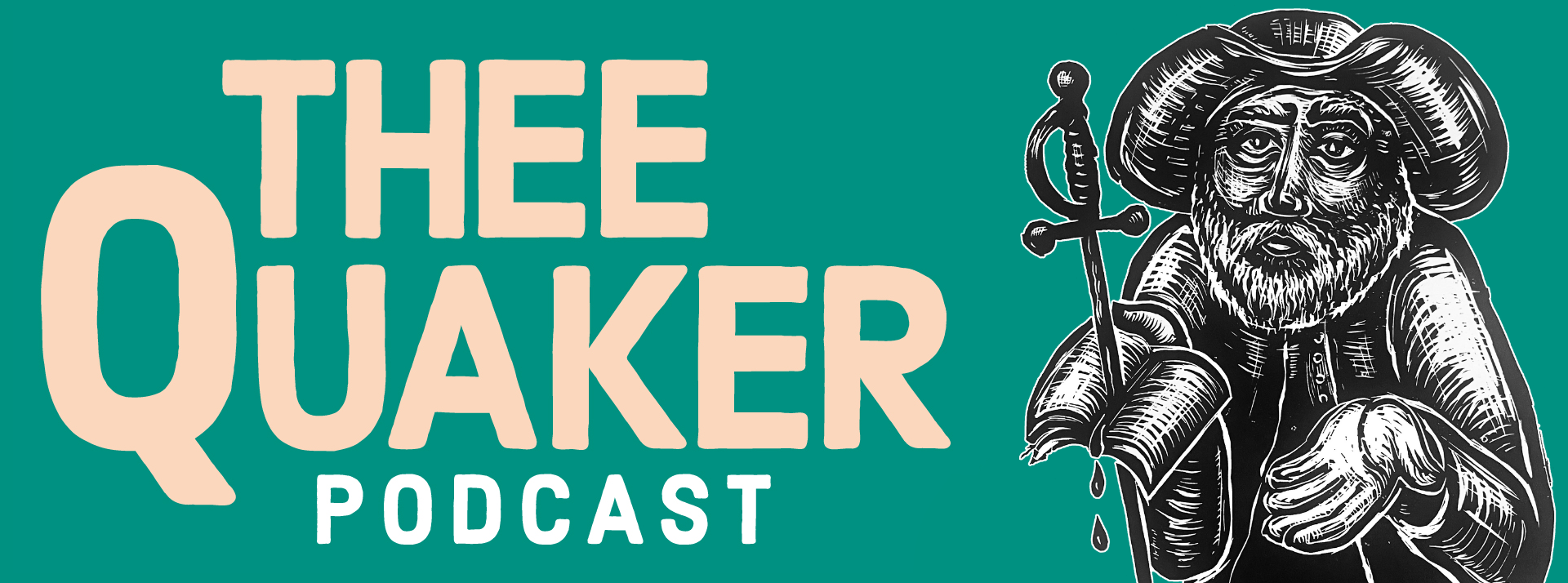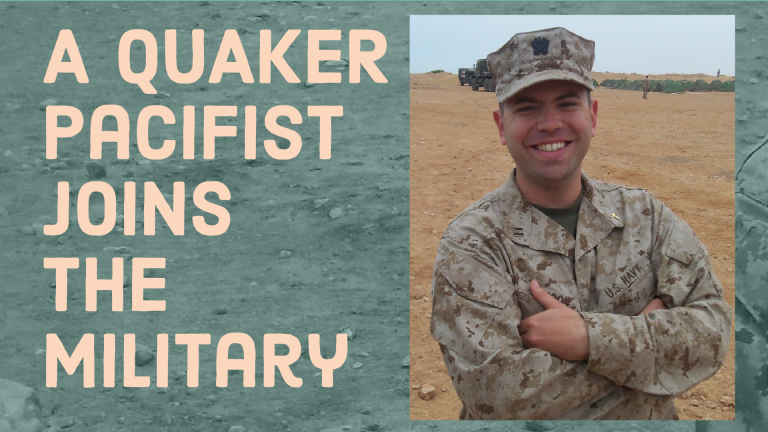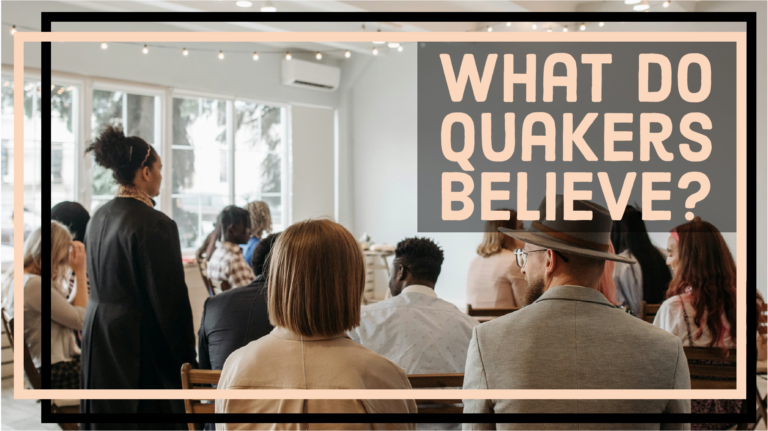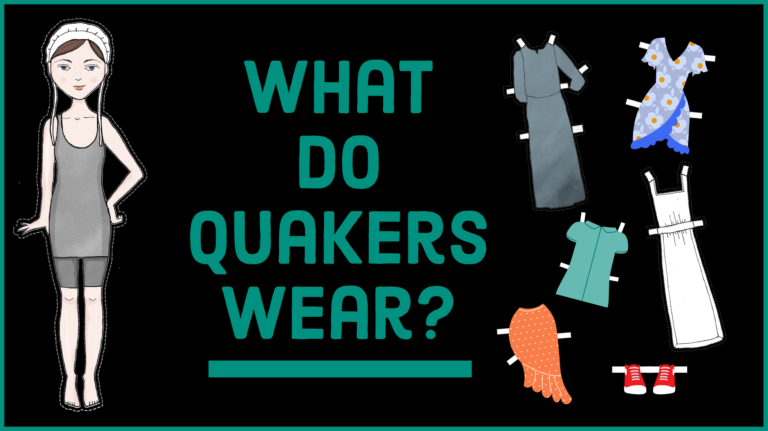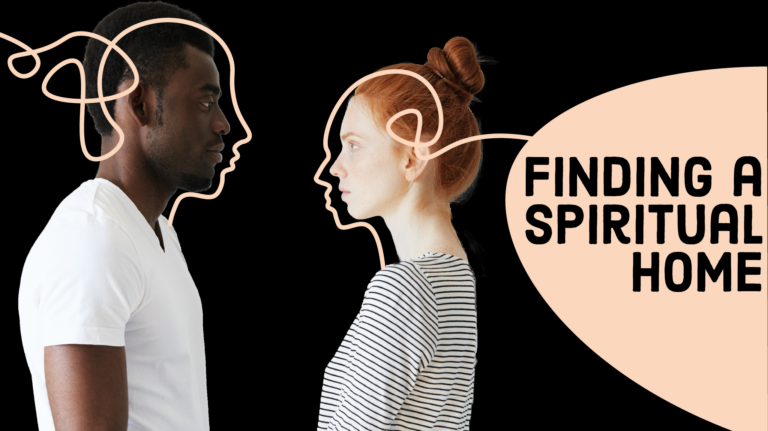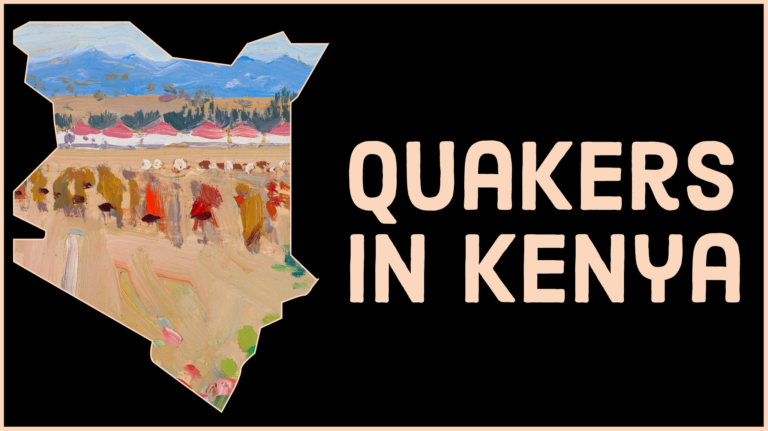Meet the Quaker Who Ran Against President Biden
Why would a virtually unknown Quaker entrepreneur attempt the impossible and run for president of the United States (in 2024)? And how in the world did he win a primary? On today’s episode, we’re going to talk to former presidential candidate Jason Palmer and find out.
Subscribe so you don’t miss an episode!
Leave a comment below to share your stories and thoughts!
Download the transcript and discussion questions.
Discussion Questions
- Jason Palmer’s early exposure to Quakerism and social justice shaped his career. How can you encourage children in your meeting or sphere toward civic engagement?
- Jason decided to run for president even though winning was a longshot. What do you think about that? When is an almost certain failure still worthwhile?
Jason Palmer: The applause was so loud. It was almost like a standing ovation. And I thought, wow, I’m definitely going to get more than 1% of the vote this time. But even I did not know that I was going to win. That was a surprise to me too.
Various: Thee Quaker Podcast. Story, spirit, sound.
Georgia: I’m Georgia Sparling and this is our penultimate episode of season 2 of the podcast! Next week, we’ll talk a bit more about what will happen in the off-season, but today is the second in our two-part series on Quakers in politics. If you missed last week’s episode, please make sure you download it! We explored the implications of Quakers in government from a historical standpoint and then we turned to what’s happening now and heard from two Friends who shared strategies, wisdom, and tools for engaging in the midst of this tense political environment that we’re in. I think it’s one of our most important episodes of the season.
Today as we continue the theme of Quakers and the political sphere, I want to ask you a question, a few questions actually: I have a question for you — would you ever run for president? Or prime minister? Or any major office?
What would you base your campaign on? How much would your public life be influenced by your Quaker faith? What do you imagine might be your first hurdle in office?
Well, today’s guest is a Quaker who actually ran for president. And no, this is not one of our history episodes, this is modern day. Jason Palmer, a Quaker businessman, ran for president for this 2024 election and against the odds actually beat President Joe Biden in one particular primary So you know I could not pass up the chance to learn more about this guy who put his name in the hat to challenge President Biden and who made news while doing it.
So, who is this Jason Palmer? Let’s find out.
Georgia: Jason Palmer had his first brush with the U.S. presidency when, as a kid, he wrote a letter to President Ronald Reagan and got one back.
Jason Palmer: For a long time, I was going around telling people, I have the president’s signature. Like he wrote back to me, you know, not realizing that it was like all these interns working in the White House responding to all these letters.
Georgia: Jason continued to follow the goings on in the White House and contemplated his own foray into politics, but it didn’t happen until he got fed up with the impending election. You know, the one in less than a month.
Jason: I decided to run for president a little bit on a whim, you might even say. I did know, I thought, always thought eventually I would get into politics, but years went by, decades went by, and suddenly I woke up and found I was 52 years old and I had not gotten involved in politics other than donating to campaigns. And I was watching the Republican debate.
Georgia: This was about a year ago.
Jason: Joe Biden said he was going to be a transitional figure. Nobody had thrown their hat in the race. And I said, you know what? Let me ask a couple of my CEOs, should I run for president? And the first two I said this to, they’re like, you mean president of the United States? Are you crazy? So I went online. It was like, how do you get registered in New Hampshire? How do you get registered in Nevada? I was like, you know, how tough can it be? I figured out it was really tough.
Jason: I thought, you know, let’s try this.
Georgia: It was relatively easy to get on the ballot in Nevada. He needed 12 people to sign a petition. He had 15 LinkedIn contacts in the state. So he arranged a dinner, they discussed politics, and he asked them if he should run.
Jason: Everybody said, absolutely. You should definitely run and then I was like, wow, this is, you know, I guess I’m doing this.
Georgia: Jason made a video to announce his candidacy and made it Internet official in November 2023.
Jason: America needs an upgrade. We started with a beautiful vision of what we could be: freedom, opportunity, equality, justice for all. But I think we all know something’s not working and we can’t find answers in the past.
Georgia: Jason says the video quickly amassed 20,000 views and hundreds of comments on LinkedIn. And has more than 300,000 views on YouTube.
Now he had a little buzz, he started to build a campaign.
It was a learning process.
Jason: I hired a couple people to be my staff to actually like fill out the paperwork, get me on the ballots in all these states. And our goal was originally to get on 40 state ballots. In the end, we only got on 16 state and territory ballots. It also is a very expensive proposition in some states.
Georgia: Now, was Jason Palmer ever going to win the 2024 presidential election? I mean. No. It was a longshot of longshots, which he will admit and he wasn’t the only one surprised when he won six delegate on Super Tuesday in the American territory of American Samoa. CNN…was also surprised. Here’s a clip with Abby Phillip and Harry Enten
Abby Phillip: Well, Joe Biden swept Super Tuesday, almost. American Samoa’s six delegates will actually go to another candidate, and he’s someone that I guarantee you most Americans have not heard of before tonight. His name is Jason Palmer.
Harry Enten: You look at the board. You look at the map, you got Joe Biden blue all over the place, except right down here these little dots, American Samoa, I want you to look at the vote tally here, 51, to 40. Not very much. That’s 11 ahead. But hey, that will work.
Georgia: Who is this guy who decided to try the impossible and run for president of the United States of America — a virtually unknown entrepreneur with no political experience?
Jason: I was born in Aberdeen, Maryland, if you really want to go back to the very beginning. And my father was a golfer and my mother was a Methodist. We ended up moving to Poughkeepsie, New York and my best friend down the street was a boy the same age as me named David Kaiser and we would always play together, played street ball together, we hung out together, we collected baseball cards together and he was Quaker.
And I didn’t know anything about Quakerism until I went to what I considered summer camp with him, which was a place called New York Yearly Meeting. And over time of attending this summer camp and going to a place called Pal House with my best friend David, I eventually realized, you know what, this religion speaks to me more than my dad’s golf or my mom’s Methodism.
The main thing that drew me to Quakers is how much they truly love every person as an equal. And they were welcoming of me, and I saw them be welcoming of lots of other people, regardless of their circumstances. And that won me over pretty quickly to be interested and then over time and to say, I want to be part of this faith.
Georgia: Jason has attended silent meetings for worship since he was a kid and continued into his adulthood, going to meetings in Brooklyn, Baltimore and Chatham, New York. I asked him how it was attending a silent meeting as a kid.
Jason: And so it was difficult. But you know, there’s something about there’s a reason why now people are downloading all these apps like Calm and Meditate and Meditation is increasing. There’s something about Quakerism that is kind of a little bit like meditation in communion with the Spirit that has appealed to me over time and become part of my life.
Georgia: While Jason found a spiritual path early on, it wasn’t until he was in college at the University of Virginia that he discovered his acumen for business.
Jason: My parents didn’t have enough money to send me to the University of Virginia. I was an out-of-state student. So my dad and I worked out an arrangement where he would give me $7,000 a year, it was all that they could afford. I got a little bit of money from a track scholarship. I worked as an RA in the dorms. I worked as a waiter nights and weekends to pay my way through college and then I invented these little businesses.
I started a meal plan so that students could eat at all the restaurants around campus instead of at the cafeteria. And that was called the Corner Plan and that ended up running for about 20 years after I started it in 1993 and became the largest off-campus meal plan in the country.
Georgia: The university meal plan was a couple of thousand dollars, and he says the cafeteria food was terrible.
But walking distance from campus were dozens of restaurants, plus, as a waiter at some of those restaurants, he already had an in.
So Jason started talking to the owners and came up with an alternative meal plan for students at a reasonable price and with much better food than they were getting in the dining halls. The idea took off.
Jason: The second year, I remember going to the mailbox and the woman behind the counter. She’s like, you’re not going to believe it. You’re rich. You got to come back here. And there were so many envelopes sticking out in every which direction. She’s like, I can’t even put any more envelopes in there and that day I deposited about $200,000 into the account so everybody would have their meal plans and I thought wow, I’ve gone from like living month to month with less than $100 in the bank account since I’ve, you know, since 17 years old. And now suddenly I have $200,000 and then by the end when I sold it actually was a whole million dollars a year in meal plans.
Georgia: After graduation, Jason headed to California. There, he became a cofounder of a company that helped students get their first job after college. He and his fellow founders raised $9 million and sold the business for $11.
Georgia: Then he headed back East to attend business school at Harvard.
Jason: Since then I’ve started four companies, invested in maybe 30 companies, and I do something called impact investing where it’s like venture capital, but we’re investing in mission driven companies.
Georgia: Now let’s get back to Jason’s run for president. He says his campaign was based on his understanding of Quaker leadership, guided in part by the childhood friend who first introduced him to the Religious Society of Friends.
So here are his three pillars.
Jason: Number one was conscious capitalism, that there is this way to turn capitalism into a driver for equity across our society. And it can lift up all boats, but it won’t work if we keep doing capitalism the old way. There’s very particular ways we need to the system, change the system to make it equitable for everyone.
I actually am someone who believes a lot in entrepreneurship and small business and the power of capitalism to lift people up. And so a lot of times people have difficulty understanding my politics because I’m very strongly progressive, but I’m also very strongly in favor of freedoms to help advance your economic lot in life.
Georgia: Jason attributes this social justice bent in part to early influences. As a kid, his dad introduced him to important topics like the injustices of apartheid in South Africa and he learned about prisons and the juvenile detention system from his Quaker friend’s dad, he learned about prisons and the juvenile detention system.
Jason: Now I invest in a company that actually does education in prisons and jails. And I know it is directly related to knowing that my best friend Dave’s dad worked in prisons and jails helping to educate people.
Georgia: Back to the campaign pillars.
Jason: The second is that as an investor, I see that the whole world is changing to this “new collar economy” is what I call it. And the new collar economy is where you can get certified in Google Analytics, Amazon Web Services, digital marketing, digital podcasting. You can learn these digital hybrid skills. And within one year of kind of learning plus apprenticeship, you can get skill to a middle class job and you don’t even need to go to college. \ And I’ve been investing in these certification and certificate programs, credential programs now for almost a decade. And I wanted to bring that linking to the country as well.
And then the third is about modernizing government. Our government, even when they grade themselves, they’re getting Cs and Ds and Fs in terms of their efficiency and becoming modern, using modern technology. We need to bring a whole modernization approach to how we manage government.
Georgia: Jason says the establishment of benefit corporations also known as B corporations would change communities. In comparison to more traditional C corporations whose stakeholders are owners, stockholders, and the like, B corps’ are held to more rigorous environmental, social, and business practices. Right now they account for only one or two percent of businesses and that’s something Jason would change if he were elected president.
Jason: And I would actually have it be taxed differently.
You can still be all about profit corporation. If you are, you pay 25 percent tax rate on your profits. Or you could be a public benefit corporation and have this multiple stakeholder approach and you would only pay 15 percent tax rate. I know how corporate America works. Every company in America would be trying to figure out how do I get to become a benefit corporation so that I can pay the lower tax rate. And then every company in America would be focused on a more equitable society, better rules and regulations for their employees, better benefits, better customer service, better focus on the environment and the community. And I do think honestly, that’s the number one pillar of my campaign and that’s the number one thing we need to do to heal and make our society equitable.
Georgia: Running for president is obviously not something to take lightly. It’s expensive, it’s a lot of work, and the incumbent almost always wins, so I wanted to understand Jason’s approach from a spiritual standpoint.
Jason: Well, a lot of Quakers are believers in living a life of simplicity or simple things and so I have kind of I would say like a radical Marie Kondo kind of feng shui-ness that I’ve tried to make part of my life and that I make part of every part of my know interactions appreciating the little things appreciating a person no matter how much someone might perceive them as a little person you know, making sure that my team is very diverse in terms of viewpoint and also in terms of background and religion.
Georgia: This candidacy begs the question — how can a Quaker even be president? Is there a conflict of interest between the peace testimony and being head of one of the largest militaries in the world, especially as America has given millions of dollars to provide weapons in two wars.
Jason: Yeah, well, I think that’s…a good lead into the fact that I now consider myself Quaker-ish. So even though, you know, Quakerism, I would always check the box that I am Quaker, I’m a member of the Religious Society of Friends. I do see, and in fact, you know, was it very early advocate coming out for peace in Palestine, for a ceasefire, for an exchange of hostages, you know, I think even there can be a peace in Ukraine with Russia, and I would push for that as well. But you have to be realistic that when attacked you need a strong defense and but it should be always about defense never about offensive warfare and so there is a way that I consider Quaker ish to always be focused on how can we quickly get to peace with the least loss of life possible but you also do need to defend yourself and so that’s why I do think in this particular case I’m more Quaker-ish than know, Quaker, because I do think straight Quakers have done incredible things and I do strongly believe in those, but I do think there is some point in which you have to defend yourself.
Georgia: But let’s check where we are. We’ve got this Jason Palmer guy, an unlikely candidate — he’s Quaker slash Quaker-ish. He’s on some ballots, he’s gotten some buzz, he’s got ideas, he’s got ideals, and pretty soon he’s going to have a win that nobody saw coming. That’s after the break.
Georgia: So hello, how are you today?
Georgia: So hello, how are you today?
Dan Consiglio: I’m doing well. How are you?
Georgia: Yeah, I’m doing great. Thanks for coming out and glad we could coordinate.
Dan: Absolutely.
Georgia: And you’re a teacher. Is that right?
Dan: I am. Yeah, I teach middle school.
Georgia: Bless you.
Dan: That’s everybody’s response.
Georgia: This is Dan Consiglio, a member of Lansdowne Friends Meeting in Pennsylvania. Dan first encountered Quakers at Swarthmore College about 25 years ago, when he and his now wife were students. That was where he attended his first meeting at Swarthmore Friends.
Dan: So it’s unprogrammed. They didn’t give a query, it was just like, people came in, sat down, some folks smiled at me, and I sat there for about 10 minutes, I was like, Oh, wow, this is real, like, we are actually going to sit here in silence for an hour. The messages themselves didn’t really speak to me, but it was I think, the just the, just the idea that like Quakers, you know, we didn’t get rid of the clergy, we got rid of the laity. So it’s like, everybody gets to stand up and talk. And, you know, and I think like, just that felt really empowering to me.
Georgia: Years later, when Dan and his wife were interested in providing a spiritual background for their young kids. They decided to look into the school at Lansdowne Friends Meeting.
Dan: I think just that the people that we met, there were just wonderful people who like said all the right things. And, you know, were really very caring and asked a lot of interesting questions. And so we’re like, oh, there’s a meeting connected there. Let’s try this meeting out. And similarly, you know, walked in and just like were welcomed by so many people,
Georgia: Within a year, they were fully involved and had even joined committees.
Dan: I think the thing that’s always drawn me spiritually to Quakerism is just that. Every time I walk out of a meeting, I feel like I’m still in worship mode. Like, I feel like you never really kind of leave worshipful practice as a Quaker, just this idea that, like, I never, I’m not really off the hook, like I have to, like, if I believe a thing, I have to act on the thing that’s really brought me a lot of satisfaction in my life that I’m not sure that I had before. And I think it’s made by relationships, even with like my non-Quaker friends, like I think closer and like I’m more able to, I guess, open up emotionally and like, have conversations with people that are, you know, a little more, I guess, spiritually and politically brave. If that makes sense.
Georgia: Dan is one of our new podcast supporters. And I asked him why it’s important to have and support Quaker media.
Dan: I mean, one of the cool things, actually, I really appreciate it. Like, I’ve never heard a message from a program to meeting before. That was just really neat exposure. I knew that Quaker practice was different outside of this area. And even across the country, like there are lots of programmed Quakers and United States of America. A lot of that really helped me understand like, oh, yeah, like they’re still Quaker. Like, they just, it’s a little different. Like they worship all differently, but it’s at the core, it’s still the same thing. I mean, through your shows the only exposure I ever had to that, so that was really cool. Awesome.
Georgia: Yeah, thank you for that.
What made you decide to become Thee Quaker Podcast monthly supporter?
Dan: I think that the work you all are doing is super important. You know, podcasts, I think, have a really powerful ability to reach out to folks who maybe feel isolated and show them that they’re not isolated. And you know, there can be a there is a larger community that’s happy to, to welcome them. And I think that I think you guys are doing some really great, great work to bring that to more people and I think, make that a more, I guess enriched conversation. The deep stuff is what you guys are doing. That’s really awesome. And I can contribute financially. So I’m going to.
Georgia: We’re so thankful for Dan and the many of you who have recently signed up to become podcast supporters. We know that not everyone could give, but if you’re able, please consider it. We really feel that it does fill any just stand said, to help bring connection to those who feel isolated to those who are looking for like minded people, to those who are looking for stories that will really resonate with them. So if you’re able to give head over to QuakerPodcast.com. It only takes a couple of minutes and we’re so grateful for you.
Georgia: We first heard about Jason Palmer when news outlets picked up on an unexpected victory over President Biden back in March. NPR’s headline read: “Jason Palmer beats Biden in American Samoa, and looks to Northern Mariana Islands.”
Democrats in American Samoa, a territory of the United States, had voted 51 to 40 in favor of a little-known Quaker businessman.
Jason: American Samoa is how you actually pronounce it.
Georgia: Good to know. So how did this even happen?
Jason: So everybody assumes that I like moved to American Samoa and I invited all my best friends to the caucus, but that’s not actually what happened. I have never visited American Samoa.
Georgia: Jason had observed that other candidates who were making headway had hired local staff to run a local campaign, so he did the same. 2020 democratic candidate Michael Bloomberg had also won in Samoa.
Now, just to clarify, Samoans can vote in the primaries, but their territory status means they can’t vote in the election, still they have delegates.
Jason: When you’re learning about elections you learn every vote counts and you need to talk to each person individually and so i said you know what almost every person i talked to ends up voting for me and this is a place where maybe I could get lucky and talk to everybody. There’s only going to be like two hundred or three hundred people who are going to vote here so we hired three people on the island.
Now, Michael Bloomberg spent millions of dollars to win American Samoa. I only spent $5,000 on my employees and $5,000 on advertising. But we hired three people. They made lots of local signs, like hand-drawn signs. We hosted a beach cleanup. We did three Zoom town halls. We even did a session with some school children in the school, and then they allowed me to speak for a couple of minutes at the caucus when they had their caucus. And I kind of knew that something was up just leading into the election because I was getting text messages every day of like a new American Samoan who had handmade a sign. There was like a handmade billboard. I said, my gosh, these people really like love the message. I made a six-minute video that was all about how I learned the language in American Samoa, you know, as much as you can in three weeks.
Video: Talofa lava, I’m Jason Palmer, Democratic candidate for president of the United States this coming Tuesday, March 5, you will choose who you think is the best candidate for the November general election. I’m asking for your support and vote, and would love to talk to you about why I believe I’m the best candidate for American Samoa, a beautiful…
Georgia: Jason came up with policies specifically for the Samoans, including a second hospital and an easier pathway to citizenship. After speaking at the caucus on Super Tuesday, he said:
Jason: The applause was so loud. It was almost like a standing ovation. And I thought, wow, I’m definitely going to get more than 1% of the vote this time. But even I did not know that I was going to win. That was a surprise to me too.
Georgia: Anticipating a loss, he’d planned to end his campaign on Super Tuesday.
Jason: I was flat out exhausted. I’d been traveling to Colorado, Vermont, doing all these Zoom town halls, and then we won American Samoa and the phone went crazy. And all of a sudden I was being offered chances to be interviewed on CNN, Fox, MSNBC, New York Times, Washington Post. I stayed up until three in the morning doing interviews.
Georgia: Jason also had another motive in mind. Knowing his candidacy had to end at some point, he and his team had planned to pivot to a new organization called Together! — that’s with an exclamation point.
Jason: We made it kind of a spot decision. You know what? Let’s pivot to Together! right now. Let’s not take a month off and kind of recover. Like this is our opportunity.
Georgia: During an interview with CNN after the American Samoa primary, he announced the new initiative.
Jason: It’s something that’s been in the works for a couple months, but we rolled it out early. And so ever since then, I’ve been working to try to get 20 young people elected to Congress and a million young people registered to vote.
We’re doing partnerships all across the country. We’re raising money from all quarters. Actually, most of our donations are coming in small donations of like $10, $25, $100 from people who believe we need to have national unity in our politics. We do need to work together across the aisle. We have to reduce the polarization. And most importantly, we have to start electing young people who really represent the next generation. The average age of people in Congress is 59 years old.
And that is too old. We need people who are in their 20s, 30s, maybe even early 40s. That’ll bring down the average too. And so that’s what we’ve been doing ever since.
Georgia: Jason also joined a chorus of people calling for Biden to withdraw from the presidential campaign, which had not yet not done yet when we spoke. He advocated for a “mini primary” in which the Democratic convention could choose from a few candidates, including Kamala Harris.
Back in July when I spoke with Jason, I asked him if he was hopeful about the election.
Jason: I am an optimistic person, so I am hopeful but vigilant is how I would express it. Hope alone is not a strategy. If we don’t get engaged, you don’t vote, and you don’t volunteer your time, then you will get an outcome that you don’t want.
If you want to affect the outcome, this election, more than any other, is one where you should lean in, get involved, and use every ounce of organizing power that you have to help influence the election. And that’s a big part of why I ran is I thought my voice can help change things here in this country. We can set a positive, optimistic vision for the future. I believe in values of the Democratic Party and I believe in the values of democracy, human rights, an open and tolerant society and so I’ll be supporting the candidate who most embodies those values. With all every fiber of my being too, not just from an armchair in my living room, know, every single day campaigning, trying to raise money for candidates, trying to help.
Georgia: But would he ever run for president again?
Jason: I’ve thought about it and the decision I’ve made for today is I’m going to wait two years to decide about that question. I think it’s really important that I take a break after November 5th and focus on, you know, recuperation, recovery, you know, earning a living again. But in two years’ time, I will see where we’re at as a country, see where we’re at as a Democratic party, and then make my decision. I used to think it was kind of, why would politicians just not say yes or no? But, now knowing how much work it is, all the fundraising, all the speech giving, all the work, you don’t take this lightly. You really have to make sure it’s a decision you want to make for one or two years of your life. And that’s a big decision. So I’m going to wait two years and then I’ll decide.
Georgia: It’s wild to me that anyone would ever run for a major public office. It brings up so many questions of conscience and character, so it was fascinating to hear from a Quaker-ly person like Jason. I mean our last Quaker-ish president was Richard Nixon and to put it lightly, he made some pretty bad decisions. But even though i’m not going to run for president, a lot of the same questions come up when it comes to voting. Do I have to hold my nose and vote? Is that just a reality of the human condition? Can I be hopeful like Jason Palmer?
I don’t know, but I do know I can do something right in my own area and this weekend, for me, it’s spending a few hours helping to protect the waterways down here that I love so much. So at whatever place you’re in, take some chutzpah from Jason Palmer and consider what you can do to heal the things you see that are broken. You probably won’t be 100 percent successful like Jason Palmer, but even a Samoa-sized win could begin to turn the tide.
Georgia: Thank you for listening and thank you to Jason Palmer for being our guest on this episode. If you’d like to learn more about his new initiative Together! visit togetherpurple.org. We’ll have that link and more on the episode page at QuakerPodcast.com. We’ve also got discussion questions and a transcript of this episode. While you’re there, leave us a comment and let us know what you think about a Quaker in the white house in the 21st century.
This episode was reported and produced by me, Georgia Sparling. Jon Watts wrote and performed the music. Studio D mixed the episode. Your moment of Quaker Zen will be read by Grace Gonglewski.
If you like what you hear, please consider becoming a Podcast supporter — you can do that on a monthly or a yearly basis. Head to QuakerPodcast.com and click on Support to learn more.
And now for your moment of Quaker Zen.
Grace Gonglewski: Douglas V. Steere, 1986: “Quakers enter the service of silent waiting not alone or in a series of separate reveries but in a company of worshipers; they know something of the needs of their fellow worshipers; they know something of the sufferings and needs of the world. Often they are conscious of a whole redemptive company of faithful departed ones who are engaged in this all-embracing struggle as well. This realization and these needs are gently brought into the worship in the form of intercession, of brothering the souls of others.”
Georgia: Sign up for daily or weekly Quaker wisdom to accompany you on your spiritual path, just go to DailyQuaker.com. That’s DailyQuaker.com.
Recorded, written, and edited by Georgia Sparling. Co-hosted by Jon Watts.
Original music and sound design by Jon Watts (Listen to more of Jon’s music here.)
Mixed and mastered by Studio D.
Supported by listeners like you (thank you!!)
Referenced in this episode:
- Learn more about Jason Palmer his new venture Together!
